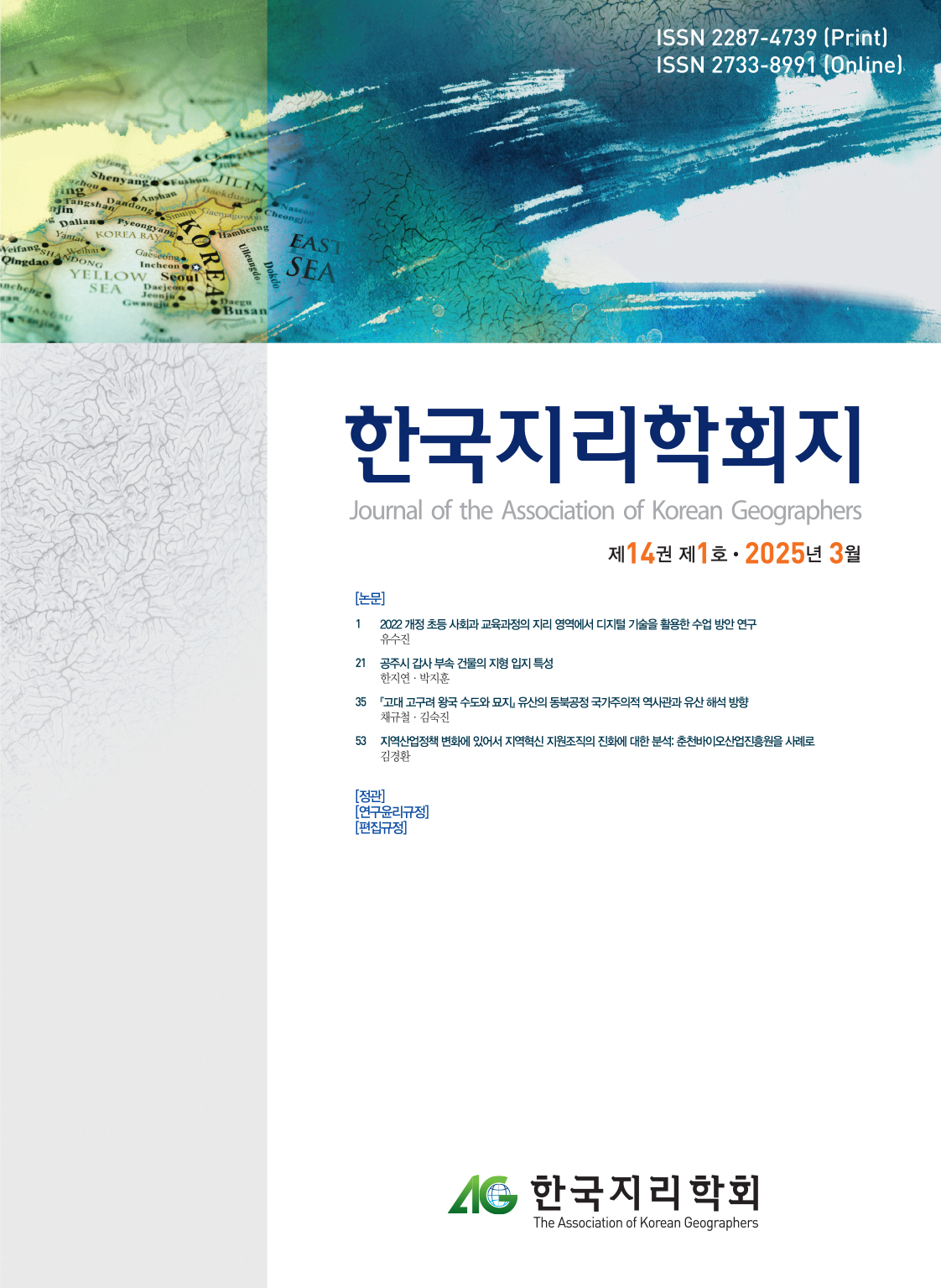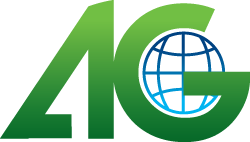Research Article
Abstract
References
Information
The 2022 revised curriculum presents the cultivation of digital literacy as a core value, and accordingly, the formation of teachers' technology pedagogical content knowledge (hereinafter referred to as TPACK) is emerging as a very important task. The purpose of this study is to analyze the determinants of geography teachers' TPACK through a structural equation model and provide a theoretical foundation for developing a standard model that can measure geography teachers' TPACK competency based on this. The main results of the analysis are as follows. First, the factor that had the greatest influence on the formation of geography teachers’ TPACK paths was found to be TK. This emphasizes that understanding of geographic information technology is the most important factor in the formation of TPACK in geography classes using technology. Second, the factor that had the greatest influence on the formation of geography teachers’ TPACK paths after TK (Technological Knowledge) was PK (Pedagogical Knowledge). This emphasizes that teaching and learning strategies should be established that are tailored to the characteristics of geographic information technology, not just teaching strategies, in geography classes using technology. In order to suggest ways to strengthen geography teachers’ TPACK capabilities, follow-up studies such as the development of a training course to strengthen teachers’ TPACK capabilities and qualitative research on the determinants of TPACK capabilities should be conducted based on the results of this study.
2022 개정 교육과정은 디지털 소양 함양을 핵심 가치로 제시하고 있으며, 이에 따라 교사의 테크놀로지 교수내용지식(이하 TPACK) 형성이 매우 중요한 과제로 대두되고 있다. 본 연구의 목적은 구조방정식 모형을 통해 지리교사의 TPACK 결정 요인이 무엇인지를 분석하고 이를 토대로 지리교사의 TPACK 역량을 측정할 수 있는 표준 모형 개발을 위한 이론적 토대를 제공하는 것이다. 연구의 주요 결과는 다음과 같다. 첫째, 지리교사의 TPACK 경로 형성에 가장 큰 영향을 미치는 요인은 TK인 것으로 나타났다. 이는 테크놀로지를 활용한 지리수업에 있어서 지리정보기술에 대한 이해도가 TPACK 형성에 가장 중요한 요인임을 강조하는 것이다. 둘째, TK 다음으로 지리교사의 TPACK 경로 형성에 많은 영향을 미치는 요인은 PK인 것으로 나타났다. 이는 테크놀로지를 활용한 지리수업에서 교수 전략만을 고려할 것이 아니라 지리정보기술의 특성에 맞춘 교수학습전략을 세워야 함을 강조하는 것이다. 지리교사의 TPACK 역량 강화방안을 제시하기 위해서는 본 연구 결과를 토대로 교사의 TPACK 역량 강화를 위한 연수과정 개발 및 TPACK 역량 결정 요인에 대한 질적 연구 등의 후속 연구가 이어질 필요가 있다.
- 교육부, 2022a, 「초중등학교 교육과정 총론」, 교육부 고시 제2022-33호.
- 교육부, 2022b, 「사회과 교육과정」, 교육부 고시 제2022-33호.
- 김민성, 2016, “로우테크 원격탐사 활동의 교육적 효과-비판적 공간사고력을 중심으로,” 한국지리환경교육학회지, 24(4), 115-130.
- 김민성, 2021, “4차 산업혁명 시대 인공지능의 교육적 활용과 지리교육의 과제,” 한국지리학회지, 10(3), 329-345. 10.25202/JAKG.10.3.1
- 김민성, 2022, “목표기반시나리오를 활용한 인공지능 기반 지리 교수학습 전략 개발,” 한국지리학회지, 11(3), 271-286. 10.25202/JAKG.11.3.1
- 김민성・이상일・이소영, 2016, “지리공간서비스의 교육적 함의와 교수학습 모델 개발,” The SNU Journal of Education Research, 25(1), 1-26.
- 박기철・강성주, 2014, “초・중등교사의 테크놀로지 교수내용지식(TPACK)에 대한 인지경로 모형 개발,” 교원교육, 30(4), 349-375. 10.14333/KJTE.2014.30.4.349
- 박상준, 2018, 「사회과교육의 이해: 4차 산업혁명과 미래 사회 대비」, 파주: 교육과학사.
- 박지수, 2020, “지도학습을 위한 초등교사의 테크놀로지 활용 실태 및 TPACK 분석,” 한국사회과교육연구학회, 59(3), 81-101. 10.37561/sse.2020.09.59.3.81
- 배병렬, 2007, 「AMOS 7에 의한 구조방정식모델링: 원리와 실제」, 청람:서울.
- 성정원・신병철, 2023, “ChatGPT를 활용한 서・논술형 평가 자동 채점 가능성 탐색: 세계지리 서・논술형 평가를 중심으로,” 한국지리학회지, 12(3), 415-432. 10.25202/JAKG.12.3.3
- 송언근・이동민, 2014, “교실 지리 탐구에서 스케일, 차원, 재현의맥락에서 본 구글 어스의 자료적 의미 -서재리 구유로를 중심으로-,” 한국지리환경교육학회지, 22(1), 79-94. 10.17279/jkagee.2014.22.1.79
- 이다희, 2018, “수학교사의 테크놀로지 교수 내용 지식에 관한 연구: 측정 도구 개발, 교육요구도 및 수업 실제 분석,” 고려대학교 박사학위논문.
- 이종원, 2012, “공간정보기술의 활용과 교실수업의 변화 : 여섯교사의 사례,” 대한지리학회지, 47(6), 955-974.
- 이종원, 2023, “디지털 전환의 시대에 대응하는 교육과정의 개발 - 한국지리 탐구과목을 사례로,” 한국지리환경교육학회지, 31(1), 93-106.
- 이진희・조인정, 2016, “지리공간기술의 지리교육현장 적용에 대한 예비교사들의 태도 연구,” 한국지리학회지, 5(2), 85-97. 10.25202/JAKG.5.2.1
- 이진희, 2023, “지리학습을 통한 공간적 사고 교육에 대한 예비교사와 현직교사 간 성향 비교,” 한국지리학회지, 12(2), 297-312. 10.25202/JAKG.12.2.3
- 채민수, 2024a, “지리교과의 에듀테크 활용실태 및 활성화 방안,” 한국지역지리학회지, 30(3), 408-427. 10.26863/JKARG.2024.8.30.3.408
- 채민수, 2024b, “지리교사의 TPACK 평가 척도 개발,” 한국지리환경교육학회지, 32(3), 119-136.
- 최경식・백성혜, 2020, “예비교사의 TPACK 역량 측정 설문과 수행평가 결과의 차이,” 한국과학교육학회지, 40(4), 437-449.
- 함경림, 2021, “예비교사들이 경험한 구글어스 활용 지리수업의 특징과 유용성, 한국지리환경교육학회지,” 29(1), 73-87.
- 홍태완, 2023, “가상 답사 공간 불균형에 대한 실천적 대안: 구글 스트리트 뷰로 가상 답사 공간 만들기,” 한국지리학회지, 12(4), 509-531. 10.25202/JAKG.12.4.1
- Abbitt, J.T., 2011, Measuring technological pedagogical content knowledge in preservice teacher education, Journal of Research on Technology in Education, 43(4), 281-300. 10.1080/15391523.2011.10782573
- Archambault M.L. and Barnett H.J., 2010, Revisiting technological pedagogical content knowledge: Exploring the TPACK framework, Computers & Education, 55(4), 1656-1662. 10.1016/j.compedu.2010.07.009
- Archambault, L. and Crippen, K., 2009, Examining TPACK among K-12 online distance educators in the United States, Contemporary Issues in Technology and Teacher Education, 9, 71-88.
- Bodzin, A., Peffer, T., and Kulo, V., 2012, The efficacy of educative curriculum materials to support geospatial science pedagogical content knowledge, Journal of Technology and Teacher Education, 20(4), 361-386.
- Chai, C.S., Koh, J.H.L., and Tsai, C.C., 2010, Facilitating preservice teachers’ development of technological, pedagogical, and content knowledge(TPACK), Educational Technology and Society, 13(4), 63-73.
- Doering, A., Koseoglu, S., Scharber, C., Henrickson, J., and Lanegran, D., 2014, Technology integration in K-12 geography education using TPACK as a conceptual model, Journal of Geography, 113(6), 223-237. 10.1080/00221341.2014.896393
- Duke, N.K. and Mallette, M.H. (Eds.)., 2004, Literacy research methodologies. New York, NY: The Guilford Press.
- Gall, M.D., Gall, J.P., and Borg, W.R., 2007, Educational research: An introduction (8th ed.). Boston, MA: Pearson Education.
- Graham, C.R., Burgoyne, N., Cantrel, P., Smith, L., Clair, L.S., and Haris, R., 2009, TPACK development in science teaching: Measuring the TPACK confidence of inservice science teachers, TechTrends, 53(5), 70-79. 10.1007/s11528-009-0328-0
- Hong, J.E. and Stonier, F., 2015, GIS in-service teacher training based on TPACK, Journal of Geography, 114(3), 108-117. 10.1080/00221341.2014.947381
- Huh, S. and Jo, I., 2023, Successes and struggles: Evaluating geospatial technologies integration in geography lessons using TPACK, Journal of Geography, 122(5), 126-139. 10.1080/00221341.2023.2224814
- Kabakci Yurdakul, I., Odabasi, H.F., Kilicer, K., Coklar, A.N., Birinci, G., and Kurt, A.A., 2012, The development, validity and reliability of TPACK-deep: A technological pedagogical content knowledge scale, Computers and Education, 58(3), 964-977. 10.1016/j.compedu.2011.10.012
- Koehler. M.J. and Mishra, P., 2009, What is technological pedagogical content knowledge (TPACK)?, Contemporary Issues in Technology and Teacher Education, 9(1), 60-70.
- Koehler, M.J., Shin, T.S., and Mishra, P., 2012, How do we measure TPACK? Let me count the ways (Eds.). Handbook of Educational Technology, Teacher Knowledge, and Classroom Impact: A Research Handbook on Frameworks and Approaches, 16-31, NY: Springer. 10.4018/978-1-60960-750-0.ch002
- Lee, M.H. and Tsai, C.C., 2010, Exploring teachers’ perceived self efficacy and technological pedagogical content knowledge with respect to educational use of the World Wide Web, Instructional Science, 38(1), 1-21. 10.1007/s11251-008-9075-4
- Schmidt, A.D., Baran, E., Thompson, D.A., Mishra, P., Koehler, J.M., and Shin, S.T., 2009, Technological pedagogical content knowledge (TPACK): The development and validation of an assessment instrument for preservice teachers, Journal of Research on Technology in Education, 42, 123-149. 10.1080/15391523.2009.10782544
- Shulman, L., 1986, Those who understand: Knowledge growth in teaching, Educational Researcher, 15(2), 4-14. 10.3102/0013189X015002004
- Publisher :The Association of Korean Geographers
- Publisher(Ko) :한국지리학회
- Journal Title :Journal of the Association of Korean Geographers
- Journal Title(Ko) :한국지리학회지
- Volume : 13
- No :3
- Pages :231~244
- DOI :https://doi.org/10.25202/JAKG.13.3.2



 Journal of the Association of Korean Geographers
Journal of the Association of Korean Geographers






